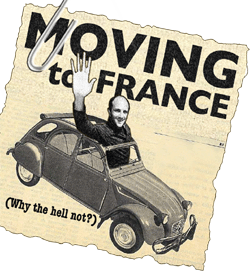Interesting times
Two days of drama. It began yesterday, Monday, morning. First thing bright and early we got a call from George, the realtor whose appointment we'd cancelled in light of our accepted offer. Sarah answered, and like a proper salesman, George did his best to entice her to come to see the houses he had on offer despite our resolve to buy the house we'd already seen. But finding himself rebuffed, he decided to change tack. For not ten minutes after Sarah had hung up, he called again.
"I've been speaking to someone in my office, and they've told me that a few sales have fallen through where you're planning on buying, because there's talk of a new highway going through. People have pulled out of sales because of the uncertainty. Just wanted you to know."
Hmmm. Sour grapes? Genuine helpfulness? A combination of the two? How could we know? We tried calling Steve to ask about it (and a few other questions we had anyway), but Monday is his day off. Likewise the Montcaret Mairie. No answers, alas, leaving us at the mercy of our imaginations. Was Steve concealing info from us? Is George telling the truth? Where could they possibly put a new highway? And what impact could it have on our house?
We examined the maps during breakfast trying to answer these last questions, and continued to pore over them intermittently throughout the day. What we were afraid of was either that there would be too much newly invited traffic and noise and danger, not to mention plain old ugliness, or that we'd be cut off from nearby places which we'd hoped to be able to reach on foot or by bicycle. We concluded that it just didn't look sensible to add another road, nor to expand the 936, which would have destroyed the many villages which lie along its pavement shores. Here's what the area looks like:
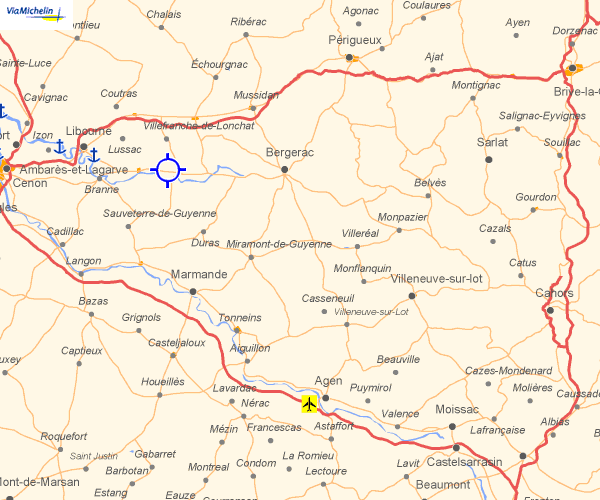
The road George warned us of is, according to him, supposed to service the Libourne - Bergerac - Sarlat route. But these cities already occupy a tight triangle of motorways. Running another major highway through the middle of it, along the windy hilly river land, just wouldn't make any sense, especially since the A89, the top red line of the triangle, serves very much the same purpose as the proposed route. But since when have government decisions made sense?
So it was a day full of questioning, questioning without answering, just wondering. We frolicked on the beach, and made ourselves a nice little chateau du sable, but all the time I was wondering if the deal we'd struck on that other house might prove to be equally transient.
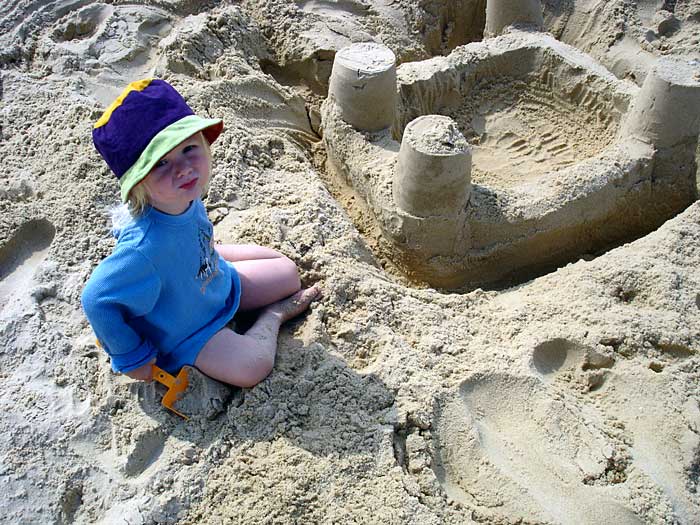
Then last night, once I was able to get online, the real research began. I found this site from 1997, a Senate transcript demanding a solution to congestion on the 936, which is Montcaret's main road. This was in response to a major accident between a truck and a train. But since 1997, the Senate seems to have forgotten the issue.
I also found this site, which is a lobbying group to increase transport links between the Bergerac region and the rest of the world, including air, rail, and road.
I also found references to the fact that the A89 is in itself a new road, having opened in 2003, and that the train line from Bordeaux through Montcaret to Sarlat is undergoing extensive renovation.
The conclusion I could draw from all of this was that there indeed used to be too much congestion on the only main road between Bordeaux and Bergerac, enough to cause major accidents. So to alleviate this problem and to increase traffic supply to Bergerac, the A89 had been built. Also the rail through Montcaret has been and continues to be beefed up, with trains increasing in number and a huge development budget from the EU. At the same time, largely thanks to Ryanair, the Bergerac airport has become a major international hub for entire Dordogne region. All of this pointed, in my mind, to an easing of pressure on the expansion of the 936, which apparently hadn't been seriously discussed in 8 years. Good.
Along the way I also discovered some generally encouraging information about the demographic trends of the Montcaret area. Good age mix, strong economics, varied industries, etc; and I further discovered this Montcaret site listing local commerce, and sights, etc. I went to sleep confident that nothing bad would happen, that our house was safe from evil highway builders, and that we were moving into a very happenning community.
But just to be sure, after we'd breakfasted this morning, we drove to Montcaret to ask the Mairie in person. Straight from the horse's mouth. But we didn't even really need to ask. Because no sooner had we entered the Mairie itself...
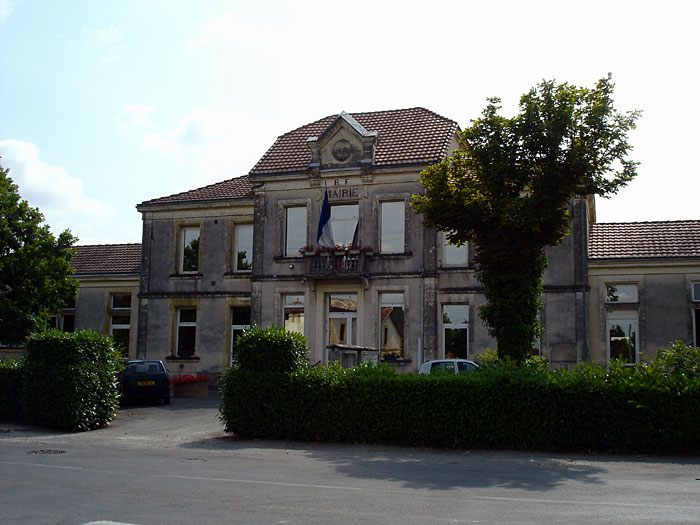
...than we saw the following map on the wall:
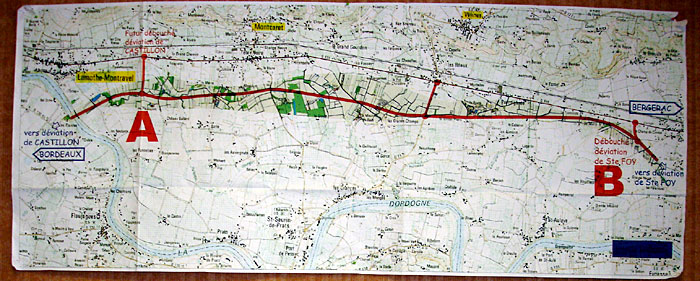
It was going to happen after all. The secretary there was very kind and friendly, and very helpful and informative. This was not going to be major highway of the sort that George had warned us about. It was a diversion, a separate 2-lane road for trucks, just to filter out the through traffic from the local traffic on the road through the nearby towns. It would hook up to other local diversion roads, and would not pose any significant difficulty for us; in fact, it would improve the village, by eliminating the noisiest and most dangerous vehicles from it. Also, one of the reasons that land in Lodève was so expensive was that the motorway enabled easier access to it. The prices jumped when the road was built. This road would function as an express all the way to Libourne, bringing Bordeaux dramatically closer to us, time-wise. It could be good for the property value. And from a cosmetic standpoint, our house, actually, would be as far from it as any in town.
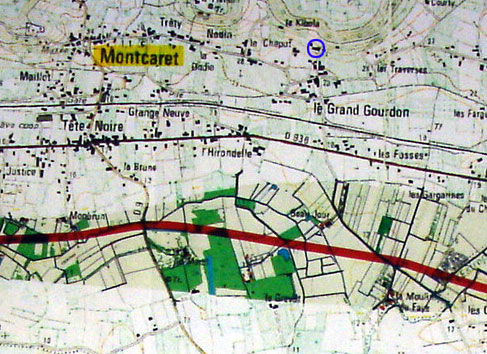
Our house is the blue circle. Below it are the train line, then the current road, and finally in red the planned diversion. It would be nearly a mile south of us. No problem at all, and not even a huge road, as it turns out. 2 lanes. Hardly a major highway, more of a cargo express. And as the secretary pointed out, they've been talking about it for 14 years now. Who knows when it might actually happen?
While we were there, we also asked about school for Kepler. She explained about the French school year, and hours, and then signed him up for the next term:
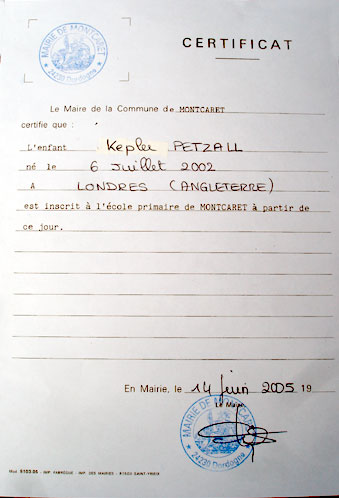
Very cool. When we asked where the school was, she flung open the back door of her office, and there it was, a schoolyard swarming with kids. 180 of them. Looked really nice too.
Just to be sure about the road, though, when we thanked her and left the Mairie's office we went to look at some of the nearby towns' diversion-roads. Not huge. No bother. We then bought a very low-scale map of the immediate area, and asked the local who might know best of all, the town tabacconist-slash-bread-salesman, whose business depends on passing traffic on the 936. "They're still building the diversions in the neighboring areas, and have been for a long time," he said. "Those should be finished in the next three years maybe. Then they'll start thinking about this road. It'll be another 10 years after that before they do anything about it. By then I won't be in this shop anymore anyway. I'll be long gone." I didn't know whether he meant retired or dead or both, and I didn't ask. But his answer was reassuring.
By now, both Sarah and I were satisfied that the road was not going to be an issue for us; it would be far away, and not so big, and might actually make the town nicer, by getting all the huge lorries off the road -- if and when it happens at all. Case closed.
No sooner had we reached this conclusion, however, than another thunderbolt struck. Steve on the phone.
"No word yet on the asbestos or lead," he told us, "we should have those reports later today. But the termite guy was there and he found some traces of termites. Now, before you panic, the current owner says that the same traces were on the report when she moved in, but that the previous owner had already treated them and that they are long gone. There are still old cans of termite treatment in the basement, apparently. She says that she's noticed no new termite activity since she's had the house, and that the traces are just remnants of a long-ago problem that's been fixed. Also, the extent of the traces is limited to a small part of the bottom floor, in none of the habitable spaces. Mostly in the storage area."
"How can we be sure?" I asked.
"You can't except by setting traps for the termites. Some guys come and drill some holes, insert some traps, then come back periodically to check on them, and if termites turn up in the traps, then they have to treat it. But none of the traces discovered are structurally dangerous. No beams need to be replaced. But the owner was foolish not to have gotten some experts in to verify that there is no longer a problem."
"So what are we looking at?" I asked.
"If they set some traps and nothing turns up as the owner says," Steve told me, "a few hundred Euros at the most, because the problem is truly gone and no treatment will be necessary. But if there turn out to be termites, then they have to treat the affected wood, and empty the traps, and then maintain the cycle of checking the traps and treating the wood until the termites are all gone. Worst case scenario for a house this size, according to the inspector who saw it today, 7000 euros."
We agreed to keep our prior appointment for later in the afternoon to discuss it further, and then Sarah and I had a chance to talk. We loved this house. Could termites put us off it? Depends on the extent of it. But according to the report, the damage wasn't extensive and it was localized, and if the termites were truly gone already, we'd be giving up the house for no real reason. And we loved the house. And even the village. Every time I visit Montcaret, I'm more impressed by it. It even has a very well-organized boulodrome, where the old men gather to throw their balls (of course, it was too early at this point in the day):
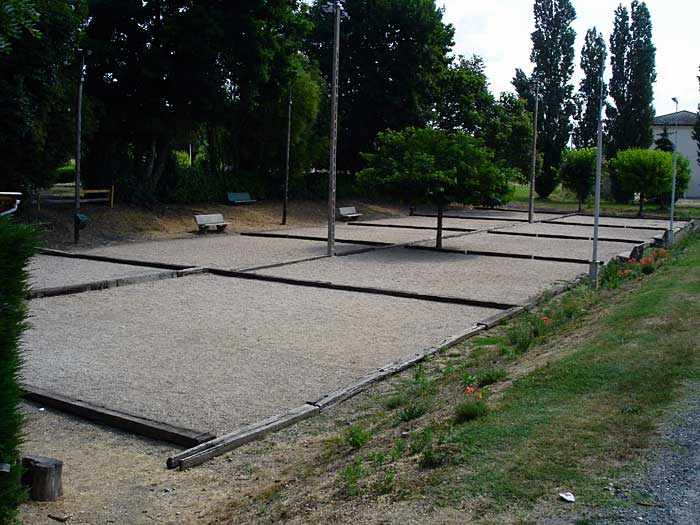
No, the price of dealing with the potential threat of termites would be worth having the house which we wanted... after all, even with 7000 euros tacked onto our agreed price, we'd still be under budget, and therefore we decided upon a course of negotiation. We had a meeting set up with Steve this afternoon anyway, so when we arrived, we proposed more or less splitting the difference with the vendor. 4000/3000. She says there are no termites, but we need to check it out. So if she gives us 4000 euros off the agreed price to deal with the problem, and if there turn out to be no termites, then we've done well, and she's lost a bit of money becuase she couldn't prove it herself. If there are termites, we might lose a bit, but still well under budget, and we get the house. Steve nodded, called her, discussed it, and everything was agreed upon. It's not a real problem, only a potential expense. And also a potential gain.
Everything was resolved. It had been quite a day, full of weighing pros and cons and evaluating potential unseen risks. But in the end we were satisfied that we'd be very happy to live with what the future seemed likely to bring.
Tomorrow morning, after we get a chance to see the official termite, asbestos and lead reports in person, we sign on the house. And then we leave, northward bound, UK bound, to prepare for the next phase: for the first time in Kepler's life, and mine, owning our very own home.
It's all very exciting.
